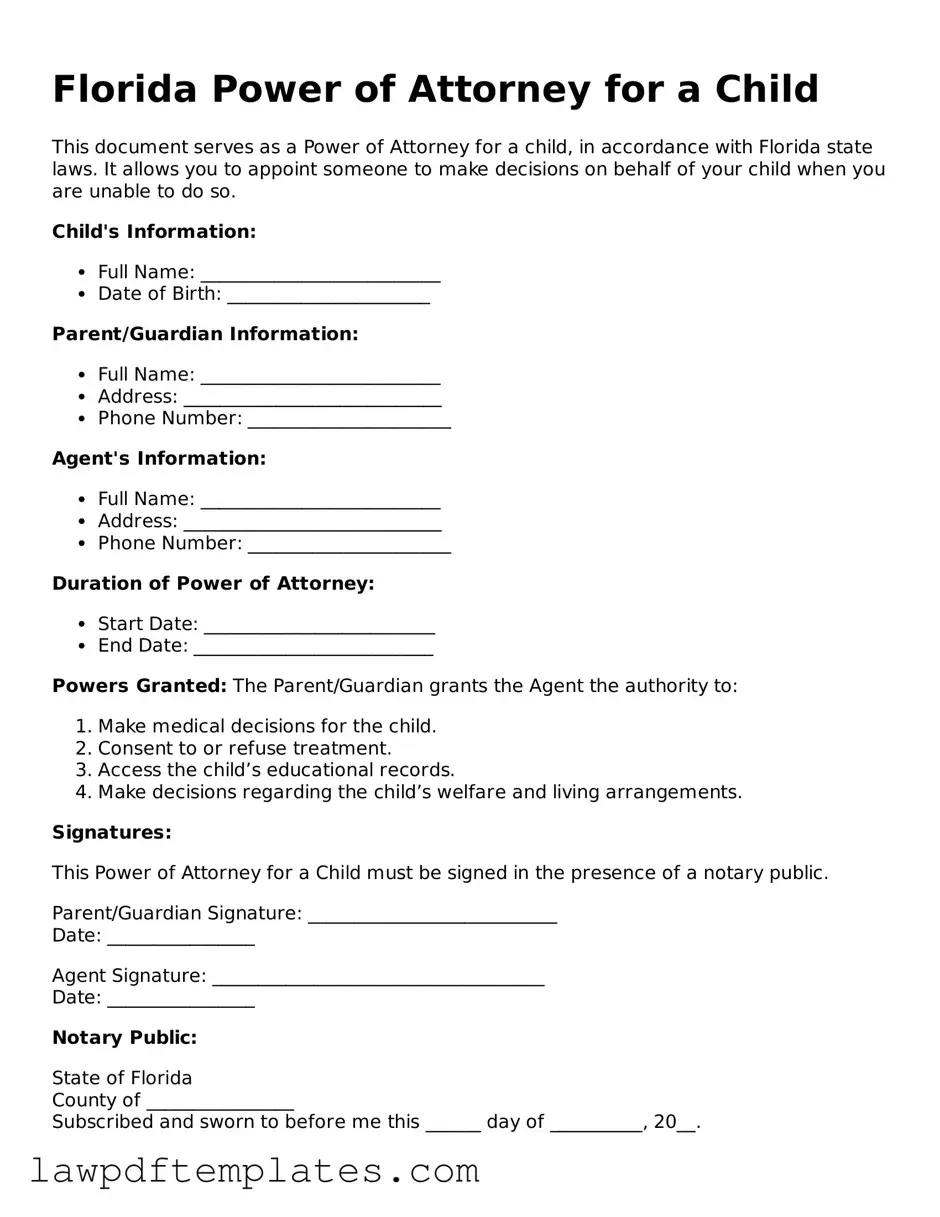Free Power of Attorney for a Child Template for the State of Florida
Form Breakdown
| Fact Name | Description |
|---|---|
| Definition | The Florida Power of Attorney for a Child form allows a parent or legal guardian to designate another adult to make decisions on behalf of their child. |
| Governing Law | This form is governed by Florida Statutes, specifically Section 709.08, which outlines the requirements for a valid power of attorney. |
| Duration | The authority granted through this form can be limited to a specific time period or remain in effect until revoked. |
| Revocation | A parent or guardian can revoke the power of attorney at any time, provided that the revocation is documented in writing. |
| Eligibility | Any adult can be appointed as an agent, but the parent or guardian must have the legal authority to designate that individual. |
| Specific Powers | The form can specify particular powers, such as medical decisions, educational matters, or travel permissions. |
| Notarization | To be valid, the form must be signed in the presence of a notary public, ensuring authenticity and legal compliance. |
| Use Cases | This form is often used for temporary situations, such as travel, medical emergencies, or when a parent is unavailable. |
| Limitations | The power of attorney does not grant the agent the ability to make decisions regarding adoption or termination of parental rights. |
Sample - Florida Power of Attorney for a Child Form
Florida Power of Attorney for a Child
This document serves as a Power of Attorney for a child, in accordance with Florida state laws. It allows you to appoint someone to make decisions on behalf of your child when you are unable to do so.
Child's Information:
- Full Name: __________________________
- Date of Birth: ______________________
Parent/Guardian Information:
- Full Name: __________________________
- Address: ____________________________
- Phone Number: ______________________
Agent's Information:
- Full Name: __________________________
- Address: ____________________________
- Phone Number: ______________________
Duration of Power of Attorney:
- Start Date: _________________________
- End Date: __________________________
Powers Granted: The Parent/Guardian grants the Agent the authority to:
- Make medical decisions for the child.
- Consent to or refuse treatment.
- Access the child’s educational records.
- Make decisions regarding the child’s welfare and living arrangements.
Signatures:
This Power of Attorney for a Child must be signed in the presence of a notary public.
Parent/Guardian Signature: ___________________________
Date: ________________
Agent Signature: ____________________________________
Date: ________________
Notary Public:
State of Florida
County of ________________
Subscribed and sworn to before me this ______ day of __________, 20__.
Notary Public Signature: ___________________________
My Commission Expires: ____________________________
Common mistakes
Filling out the Florida Power of Attorney for a Child form can be a straightforward process, but many people make common mistakes that can lead to complications. One frequent error is not specifying the duration of the power of attorney. Without a clear start and end date, the authority granted may be questioned or misunderstood. Always include specific dates to avoid confusion.
Another mistake is failing to identify the child clearly. It’s essential to provide the child’s full name, date of birth, and any other identifying information. Omitting these details can lead to legal challenges or delays in accessing necessary services.
Many individuals overlook the importance of signatures. All parties involved, including the parent or guardian and the agent, must sign the document. A missing signature can render the form invalid, so double-check that everyone has signed before submission.
Some people also forget to have the form notarized. In Florida, notarization is often a requirement for the power of attorney to be legally binding. Not having the document notarized can lead to issues when trying to use the authority granted.
Another common oversight is not reviewing the powers being granted. The form allows for specific powers to be designated, and failing to clarify what authority the agent has can lead to misunderstandings later. Be explicit about what the agent can and cannot do.
People sometimes neglect to inform the child about the power of attorney. It’s crucial that the child understands what this means and who will be acting on their behalf. Open communication helps to avoid confusion and ensures that everyone is on the same page.
Finally, many individuals do not keep copies of the completed form. It’s important to retain a copy for your records and provide one to the agent. This ensures that everyone involved has access to the same information and can refer back to the document as needed.
Discover More Power of Attorney for a Child Templates for Specific States
Power of Attorney New Jersey Requirements - It ensures that your child’s schooling and other important activities can continue without interruption.
In addition to providing clarity in the transfer process, utilizing resources such as Fast PDF Templates can greatly simplify the creation of a Florida Motor Vehicle Bill of Sale, ensuring that all necessary information is correctly documented for a seamless transaction.
Durable Power of Attorney Michigan - Provides a clear framework for authority in childcare matters.
Can a Notary Do Power of Attorney - Having this form can prevent misunderstandings among caregivers and family members.
Child Power of Attorney - A Power of Attorney for a Child allows a parent to designate someone else to make decisions for their child.
